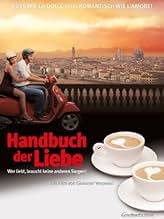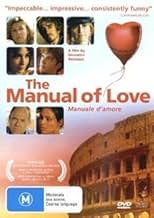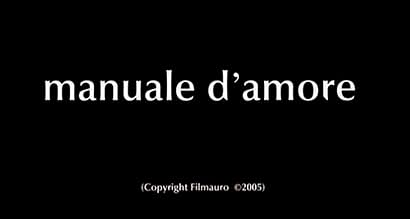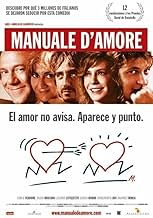IMDb RATING
6.3/10
5.1K
YOUR RATING
Four intertwined episodes on the joys and sorrows of love.Four intertwined episodes on the joys and sorrows of love.Four intertwined episodes on the joys and sorrows of love.
- Director
- Writers
- Stars
- Awards
- 10 wins & 21 nominations total
- Director
- Writers
- All cast & crew
- Production, box office & more at IMDbPro
Featured reviews
A delightful movie about the many aspects of love. The director knows comedy, doesn't talk down to his audience, and together with the screenwriter, delivers some insightful and hilarious moments. I found the movie dragged, or rather annoyed, only during one short stretch. But that was more than offset by the incredibly funny and talented Carlo Vendone as the physician in the final segment. I, and the entire full house of the audience at the St. Louis International Film Festival, was with this film every entertaining step of the way. The entire cast delivers believable performances, in a film that moves at a happy, involving pace. Laughter is contagious... see it with a group.
A flaw that I feared before watching this movie was stereotypes about love, like men playing tricks on women to conquer them or betrayals with best friends. As a matter of fact the movie is divided into various parts, each one describing a stage of love: falling in love, crisis, betrayal and abandon. The different mini-stories are tied with each other by characters who are somehow related and the end of the movie connects with the beginning as an ideal circle. Despite the same old stories about relationships and developments of love stories, this movie has anyway some good aspects. For example, each actor plays his own repertoire, displaying their qualities in what they do best and for what they're known for. The best sketches, in my opinion,are made by Goffredo, played by Carlo Verdone, and Marco, played by Sergio Rubini, who offer the sense of humor shown in their own movies.
Saw this film during a class, it's surprise to see Carlo Verdone and Silvio Muccino again, last time I saw them together in "Il Mio Miglior Nemico" (2006), so I guess both are marquee actors in Italy (actually Carlo Verdone is a director too and the cast includes a dozen of the most famous Italian contemporary actors/actresses).
Actually I heard of this series before, the "Manuela D' Amore 2" also has become a huge success in Italy (with Monica Bellucci, a current sexy symbol of Italy), and rumor says the 3rd installment will invite Robert De Niro to join a star-studded cast, which shows its ambition to conquer a more international terrain.
The film has been a successful domestic box-office bomb in 2005 and also met with mainly positive feedbacks. It consists of four stories of love, from "falling in love", "the crisis", "the betrayal" to "the abandoned", four different sets of protagonists interpret their own chapter with a previous one educes a latter story and finally the fourth chapter encircles with the first one to make everything looks so perfect.
It is an innocuous comedic film with predictable farce and generally it is quite enjoyable. Although each chapter seems nothing particularly outstanding (when we talk about love, I think we have already seen ALMOST everything on screen), the advantage is that with four different stories altogether and each lasts for only 30 mins, the film shrewdly changes to a new chapter as soon as the previous one shows a sign of burning out, which at least will not annoy the audience (critics are not included).
The film got 10 nomination of David di Donatell Awards (Italian Oscar) and won several of them (including Best Supporting Actor and Actress, Carlo Verdone and Margherita Buy), which cruelly shows the truth that now we are in a world starving for great comedies, it is not only in Italy, but the whole earth as well.
Actually I heard of this series before, the "Manuela D' Amore 2" also has become a huge success in Italy (with Monica Bellucci, a current sexy symbol of Italy), and rumor says the 3rd installment will invite Robert De Niro to join a star-studded cast, which shows its ambition to conquer a more international terrain.
The film has been a successful domestic box-office bomb in 2005 and also met with mainly positive feedbacks. It consists of four stories of love, from "falling in love", "the crisis", "the betrayal" to "the abandoned", four different sets of protagonists interpret their own chapter with a previous one educes a latter story and finally the fourth chapter encircles with the first one to make everything looks so perfect.
It is an innocuous comedic film with predictable farce and generally it is quite enjoyable. Although each chapter seems nothing particularly outstanding (when we talk about love, I think we have already seen ALMOST everything on screen), the advantage is that with four different stories altogether and each lasts for only 30 mins, the film shrewdly changes to a new chapter as soon as the previous one shows a sign of burning out, which at least will not annoy the audience (critics are not included).
The film got 10 nomination of David di Donatell Awards (Italian Oscar) and won several of them (including Best Supporting Actor and Actress, Carlo Verdone and Margherita Buy), which cruelly shows the truth that now we are in a world starving for great comedies, it is not only in Italy, but the whole earth as well.
Manual of Love (2005), directed by Giovanni Veronesi, is a charming and heartfelt ensemble comedy that explores the complexities of romantic relationships from various angles. The film is structured around four interconnected stories, each focusing on different stages of love - from the excitement of falling in love to the challenges of maintaining a long-term relationship, and everything in between.
The film's narrative is episodic, with each segment tackling a unique theme, such as infidelity, desire, breakups, and the yearning for companionship. The beauty of Manual of Love lies in its ability to explore these themes with a light touch, blending humor and pathos in a way that feels both accessible and deeply human. Though the storylines vary in tone, they all revolve around the vulnerability and complexity that love inevitably brings, offering both comic relief and emotional depth.
The ensemble cast, featuring a mix of established Italian actors like Carlo Verdone, Robert De Niro (in a small, memorable role), and others, bring the script to life with great chemistry. Each actor portrays a character at a different stage in love, giving the film a sense of universality. Verdone, who also co-wrote the script, shines as the director, balancing the comedic and dramatic elements in a way that makes the film feel both grounded and entertaining.
The cinematography and score complement the tone of the film, evoking the romantic, sometimes bittersweet atmosphere of Italy itself. The lush settings - whether it's a bustling Roman café or a quiet suburban apartment - provide the perfect backdrop for the characters' emotional journeys.
While Manual of Love may not break new ground in its exploration of relationships, it excels in its execution, offering viewers an affectionate, funny, and ultimately optimistic take on love in all its forms. It's a film that understands love's messiness and imperfections and doesn't shy away from portraying it with warmth and sincerity.
Ultimately, Manual of Love is an enjoyable film that captures the essence of romantic relationships in a way that feels both lighthearted and thoughtful. It's a warm reminder of the joys and struggles of love, making it a delightful watch for anyone who's ever been swept up in the whirlwind of romance.
The film's narrative is episodic, with each segment tackling a unique theme, such as infidelity, desire, breakups, and the yearning for companionship. The beauty of Manual of Love lies in its ability to explore these themes with a light touch, blending humor and pathos in a way that feels both accessible and deeply human. Though the storylines vary in tone, they all revolve around the vulnerability and complexity that love inevitably brings, offering both comic relief and emotional depth.
The ensemble cast, featuring a mix of established Italian actors like Carlo Verdone, Robert De Niro (in a small, memorable role), and others, bring the script to life with great chemistry. Each actor portrays a character at a different stage in love, giving the film a sense of universality. Verdone, who also co-wrote the script, shines as the director, balancing the comedic and dramatic elements in a way that makes the film feel both grounded and entertaining.
The cinematography and score complement the tone of the film, evoking the romantic, sometimes bittersweet atmosphere of Italy itself. The lush settings - whether it's a bustling Roman café or a quiet suburban apartment - provide the perfect backdrop for the characters' emotional journeys.
While Manual of Love may not break new ground in its exploration of relationships, it excels in its execution, offering viewers an affectionate, funny, and ultimately optimistic take on love in all its forms. It's a film that understands love's messiness and imperfections and doesn't shy away from portraying it with warmth and sincerity.
Ultimately, Manual of Love is an enjoyable film that captures the essence of romantic relationships in a way that feels both lighthearted and thoughtful. It's a warm reminder of the joys and struggles of love, making it a delightful watch for anyone who's ever been swept up in the whirlwind of romance.
10diane-34
Another one of those surprising little masterpieces that one sees accidentally; a movie that you know little about but once seen leaves you with warmth and satisfaction having been taken on a journey we all know.
Diane and I loved the film and left the theater with smiles on our faces and happy satisfaction animating our post-movie conversation. Maybe this pleasantness was a result of the writer's/director's choice of vignettes that ended the movie-it was the happiest, most satisfying of the four stories that composed the film.
The script was subtly formed so that the stories have a soft connection between them and the final story felt the most satisfying to me. These four faces of love are examined softly-no major drama here-just a quiet look at the most obvious faces that present to us of this feeling called love.
It is easy to see why this film won 11 Italian Oscars because the acting is acting at the point where the viewer is unaware that the people are acting the story. These theme variations are so well crafted that the viewer is left feeling that he/she is an emotional voyeur in that they are present during these stages of love.
Do make an effort to see the film-it is worth your time and effort to do so.
Diane and I loved the film and left the theater with smiles on our faces and happy satisfaction animating our post-movie conversation. Maybe this pleasantness was a result of the writer's/director's choice of vignettes that ended the movie-it was the happiest, most satisfying of the four stories that composed the film.
The script was subtly formed so that the stories have a soft connection between them and the final story felt the most satisfying to me. These four faces of love are examined softly-no major drama here-just a quiet look at the most obvious faces that present to us of this feeling called love.
It is easy to see why this film won 11 Italian Oscars because the acting is acting at the point where the viewer is unaware that the people are acting the story. These theme variations are so well crafted that the viewer is left feeling that he/she is an emotional voyeur in that they are present during these stages of love.
Do make an effort to see the film-it is worth your time and effort to do so.
Did you know
- TriviaAll entries contain spoilers
- ConnectionsFollowed by Manuale d'amore 2 (Capitoli successivi) (2007)
- How long is Manual of Love?Powered by Alexa
Details
- Release date
- Country of origin
- Languages
- Also known as
- Manual of Love
- Filming locations
- Rome, Lazio, Italy(Exterior)
- Production company
- See more company credits at IMDbPro
Box office
- Gross worldwide
- $22,281,609
- Runtime1 hour 56 minutes
- Color
- Sound mix
- Aspect ratio
- 1.85 : 1
Contribute to this page
Suggest an edit or add missing content

Top Gap
By what name was Leçons d'amour à l'italienne (2005) officially released in India in English?
Answer

























